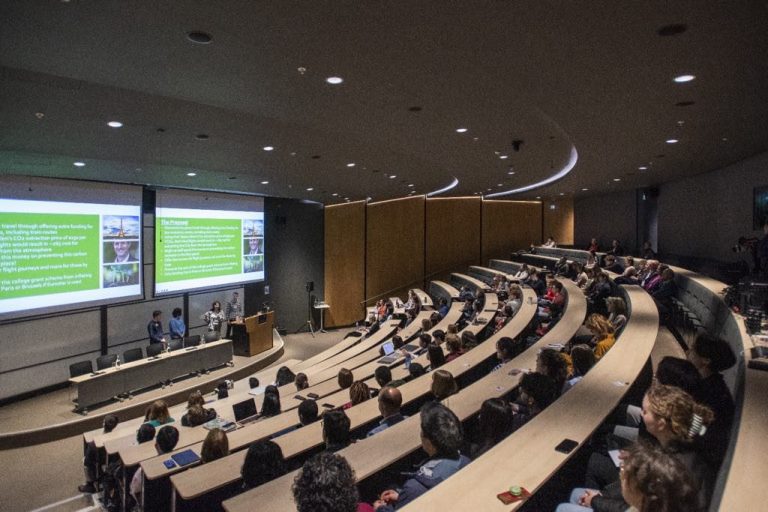Considering women have only received degrees from Oxford since 1920 and most colleges have only been co-educational since the 70s, there are an impressive number of women’s societies.
We have societies which focus on issues facing women and gender minorities in Oxford, like the Feminist Society (FemSoc) and the SU Women’s Campaign (WomCam). We have societies promoting gender equality in male-dominated subjects, like Oxford Wom*n in Computer Science Society (OxWoCS) and Oxford Women in Engineering, Science and Technology (OxWEST).
There are countless societies supporting women seeking careers in male-dominated fields, including the highly influential Oxford Women in Business (OxWIB, which boasts a 45-person committee), as well as Oxford Women* in Law, Oxford Women* in Consulting, and more recently Oxford Women* in Government. There’s an Oxford Women of Colour Society (WocSoc), the annual charity campaign Oxford PinkWeek, and Oxford FemTech Society promoting research into women’s health. All this, and even more new women’s societies are likely on the way.
A little bit of history
Student-run organisations for women have been around for almost as long as Oxford has had female students (which, admittedly, is not very long). The Oxford Women Students’ Society for Women’s Suffrage formed in 1911, when individual suffrage societies at the women’s colleges combined to form one movement. The OWSSWS (catchy) was allied to the National Union of Women’s Suffrage Societies, led famously by Millicent Fawcett, and Oxford’s women joined mass demonstrations in London. The banner they carried still hangs to this day in St Hilda’s College.
It is easy to see the need for women’s organisations in this era: a time before equal voting rights and the widespread social change we have seen across the 20th and 21st century. But perhaps the demand is less clear now. Discrimination based on sex is prohibited under UK law following the 2010 Equality Act. What can all these women’s societies be fighting for? To find out, I spoke to eight of their presidents.
The societies and their aims
Anita Okunde, co-chair of the SU Women’s Campaign, summarised their work as “making sure that women in Oxford feel like their experiences are valuable and meaningful”. WomCam is, both nominally and in practice, a campaign, so it is perhaps the most overtly activist of the societies I encountered. WomCam’s goals change depending on the priorities of its committee, as well as in reaction to what’s going on in Oxford. Anita elaborated on her current project to advocate for awareness of women’s health issues: “After the last set of graduations we had loads of people messaging the account about how they had certain [health conditions] that under the university guidelines don’t class as serious issues, but really impacted their exams.”
Other societies have less focus on taking action or campaigning for change, instead running social or discussion-based events. For instance, Oxford FemSoc meets weekly for their ‘Liberation and Liquor’ discussion group, which promises cheap drinks and a circle of students sharing opinions on a feminist topic. On their termcard for Michaelmas 2024 are discussions such as ‘Is there a useful universal feminism?’, and the no doubt controversial ‘Is Oxford sexist?’. Kaiya Tiwari, FemSoc president, said, “our principal goal is education,” which she described as “the key catalyst to making social change.”
Oxford’s Women of Colour Society (WocSoc) runs a mix of discussion groups and social events such as karaoke, friendship bracelet making, and trips for boba. WocSoc began in 2022 from a group of three friends, and has grown to a committee of 14 people, including two dedicated Welfare roles. President Eugenie Sumkoska said that the society focuses on “creating a safe space for women of colour […] The core of it is that shared experience element.” They are also working on events to actively help women of colour combat discrimination, including a workshop “to give people the instruments and tools to react to microaggressions.”
Other societies focus less on the present experience of women at Oxford, and more on their future: in entering careers that are either male-dominated, or present difficulties to women which male counterparts may not face. “Our primary mission is to democratise opportunity,” said Elisha Khannah, president of OxWIB. “We want that to be opportunity for everyone.” Although it is now a well-known Oxford powerhouse, OxWIB was founded less than 20 years ago, in 2008. “Women had finally reached the higher levels, [so] they were able to institute these programmes that they would love to have had when they were younger.”
Oxford Women* in Government is the newest society I spoke to. Founded in October 2023, they already have over 900 Instagram followers and a well-stocked termcard. Co-presidents Gaya Wimalasundera and Anika Gupta also referred to a primarily educational purpose. Their main mission, said Gaya, is “to spread knowledge and be a place where women can learn about a career path that they might want to explore”. Anika also noted that OxWIG is committed to being politically neutral, and is a “place to foster diverse conversations”. It stands as an accessible alternative to party-aligned political societies, which some may find more intimidating.
I also spoke to the Nirali Jain, president of Oxford Women in Engineering, Science and Technology, and Allie Clement, president of Oxford Wom*n in Computer Science. Nirali emphasised the importance of a “safe space for women in STEM”, with a goal to “equip [them] with the resources that you might not find so easily in other societies.” Allie also described a focus on “building community”, alongside highlighting the work of women who are currently making a name for themselves in computer science, and providing networking and industry opportunities.
Oxford admissions statistics from 2021 to 2023 show that while some STEM subjects, like Chemistry, have almost equal numbers of male and female students (45.4% of admitted UK students were female), this remains far from the case for subjects like Engineering (22.4%), Computer Science (26.7%), and Physics (19.8%).
Allie describes Computer Science as highly male-dominated: “It’s almost a social norm to walk into a room and it all be men […] It feels strange if it’s a room of females.” OxWoC provides conferences and talks where female majority is for once the norm.
A common mission?
It is worth noting here that I myself have been involved in women’s societies. My time as president of Oxford FemSoc in the 2023-2024 academic year was without a doubt the most rewarding experience of my time at university.
While president, I was presented with lots of opportunities to collaborate with other societies – not just women’s societies, but groups from all over the university. I spent a lot of time thinking about whether our missions aligned, and whether such collaborations would be enjoyable or beneficial for FemSoc members. Some collaborations went so well that we repeated them – FemSoc X WocSoc will always be a favourite of mine – but other collaborations were politely declined.
FemSoc welcomes all opinions in its discussions, but the committee holds a firmly intersectional feminist ideology. Other women’s societies might be perceived as feminist and/or activist, but several presidents told me activism was not a key priority for them. Gaya (OxWIG) said, “I don’t think we see OxWIG as merely a form of activism, it’s very much just, this is what we’re interested in, this is what we want to do [government and policy].”
Elisha (OxWIB) agreed. “It’s funny because when I’m in it, I don’t think it [is activist] at all, I think it’s so normal. […] It’s like our safe space.” However, the story changes when she speaks to people outside of the society bubble. “It feels activist, because some of the things that I’m saying, that I think should be apparent, become controversial.” The need for women’s spaces is a given at OxWIB – less so in the corporate world.
Nirali (OxWEST) says that while her society may be perceived as activist, “[the] mission is very much to create opportunity for like-minded people to be around each other, as opposed to making women in STEM known as a ‘new’ concept […] It’s for the women, by the women.”
Women’s societies aren’t all activist, and that’s okay
These societies are not explicitly aligned with any activist movement: their internal purpose is one of community. It might not be what the Suffragettes had in mind, but spaces for connection – even when apolitical – are undeniably vital. Allie (OxWoC) told me that she moved to Oxford in January and knew nobody in the city. “OxWoC was a bunch of people that had similar backgrounds, similar interests to me. And now most of them are my best friends.” Gaya and Anika (OxWIG) had a similar experience: “We met through OxWIG, and it turns out she lives down my road!”
Even if activism isn’t everyone’s priority, I think it’s fair to say every society plays some role in the feminist movement: social gatherings, discussions, and community are an inherent part of activism too. Feminism is often perceived as an ongoing struggle, at times dangerous for those involved. We can picture protests, and recall militant suffragettes smashing windows or going on hunger strike.
I don’t deny the importance of such forms of activism, and I feel indebted to the sacrifices of feminists before us every day. However, there is no reason that activism cannot also be enjoyable. Writer adrienne maree brown, in their book Pleasure Activism, reminds us, “There is no way to repress pleasure and expect liberation, satisfaction, or joy.” The feminist movement can – and should – involve community, and be fun. After all, marches and protests only occur because a group of people came together to organise them.
I asked Georgia Lin, a DPhil Education candidate researching student activism by women of colour at Oxford, for her perspective on whether social groups can constitute activism. Her research has involved attending meetings of FemSoc and WocSoc, and interviewing their members and committees.
Georgia told Cherwell, “Student societies like FemSoc and WocSoc provide a much-needed and often intimate space for feminists to gather in Oxford. In an institution that can be hostile to feminist thought, coupled with the sense of isolation many marginalised students feel, student-run organisations are facilitating a politics of care through weekly discussions and socials. The creation of these spaces is in itself resistance against Oxford’s patriarchal foundations.”
We attend a university where women have historically held few leadership roles. As a result, there is something inherently powerful about female society presidents. Their societies are hugely successful: proof, if any more was needed, that women are competent leaders.
I would suggest there are potential ideological differences between the societies, although this can certainly change with constantly shifting committees. While I was FemSoc president, meetings frequently involved discussion of fairly radical ideas, including the link between capitalism and the patriarchy. In Trinity 2024, FemSoc members discussed the question, ‘Is feminism inherently socialist?’ and of the 27 attendees, 26 voted in favour, and 1 abstained – far from politically neutral. While FemSoc welcomes all opinions, attendees frequently express a desire to change the roots of our social, economic, and political systems. In contrast, other women’s societies empower women to enter such capitalist systems.
Can these ideas be reconciled? Personally, I think we can acknowledge the need for wider structural change while also seeking gender equality within such structures in the short term… but that’s a FemSoc L&L debate for another time.
When all of the featured presidents gathered together to answer my questions, it certainly felt like they had common ground. They frequently echoed each other’s answers, happily chatted about annoying male employers, and discussed future inter-society collaborations. It was truly inspiring to witness.
Should men attend women’s societies?
Most societies mentioned here have at least some events open to men. In fact, one of FemSoc’s elected committee roles each year is a ‘Men’s Rep’ who advocates for men’s issues within a feminist context. This academic year, they also have a male Vice President.
Kaiya (FemSoc) said, “The men on our committee are really amazing, and you can really tell that they are so passionate about it – it’s really refreshing to see.” She also mentioned that having men on their committee might encourage male attendance, joking, “Sometimes the only way to get men to engage is getting a man to tell them.”
FemSoc encourages male attendance both to “hear their points of view, but also let them hear what we think as well.” However, Kaiya also acknowledges the danger of this: “When you welcome men into a space you do have that issue of it no longer being a safe space… I’m conscious of things being said that are going to make people feel uncomfortable.” She begins every meeting by pointing out their Welfare Rep, encouraging attendees to step out or speak to a committee member if something makes them feel unsafe or upset.
Elisha (OxWIB) also described attempts to boost male attendance at their termly Presidents’ Ball: “One of our favourite things to do now is we all bring every single male friend that we can rope in to attend […] it’s actually been one of our most successful initiatives.” Male attendees (affectionately called the OxMIBs) are welcome at many of their events. “We have a specific focus on accessibility, and getting men involved is crucial. We wouldn’t be helping ‘women in business’, unless we recognise that the necessary culture shift requires huge support from other groups, specifically men.”
Looking to the future
Women’s societies continue to pop up in Oxford every year. But after sufficient social change, will they eventually become obsolete or unnecessary? Should we be aiming for more women’s societies, or fewer?
Gaya (OxWIG) can see “no issue” with more women’s societies – “the more the merrier!” Eugenie (WocSoc) said, “We will continue to exist because what connects us is the shared experience, rather than any sort of equality in the world,” noting that, “it’s also slightly different with cultural societies, because there is a different dimension of connection there, so I think definitely it is something that will always exist.”
Nirali (OxWEST) does however hope for a change in their raison d’être. “I do hope that in the future women societies can exist and flourish out of the joy of being together and having shared goals, without the current societal need to simultaneously be a form of implicit activism.”
WomCam’s future really depends on Oxford, but Anita isn’t hopeful: “If the university ceases to have any problems […] so be it, WomCam has lost its purpose. But I do not see that happening.”
My key takeaway from meeting all eight women’s society presidents was how much they love their societies. They are proud of their work, and the safe, welcoming spaces they have created. They also truly enjoy attending the events they run. Maybe there are so many women’s societies because women’s societies are fun!
Oxford’s women’s societies are young – the oldest of the societies featured here (OxWEST) began in 2005. Less than 20 years later, women’s societies have large, flourishing committees, consistently high membership and attendance, and ever-growing social media followings. The numbers don’t lie. Demand is high and only increasing.
As Anika (OxWIG) said, “The fact that our societies are growing, and more and more are coming, there’s a conversation around it […] and conversation provokes people to think critically about why there is need.” So while there may still be sceptics, it doesn’t seem like women’s societies are going away any time soon.
Throughout this article, ‘woman’ is used to refer inclusively to anyone who identifies with the experiences of women, and to other marginalised genders.











